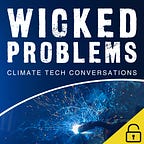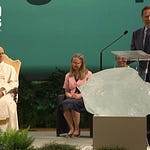In our 49th episode, Richard Delevan is back with a stellar lineup featuring our long-awaited interview with solar analyst Jenny Chase from Bloomberg NEF, about the second edition of Solar Power Finance without the Jargon, as well as her views on geese, grids, and scifi.
And with European Parliament elections just days away, we speak to two climate tech journalists in Ireland for insights about how events might play out for industries seeking some policy certainty. John Reynolds, a freelance journalist whose work you can find in The Currency, and Paul Donoghue, the Ireland reporter for Renews.biz. We discuss the current state of climate issues, renewable energy developments, and the challenges and opportunities in the climate tech sector. Jenny Chase shares her journey in solar finance, her views on virtual power plants, and the potential of solar energy in Africa. John and Paul provide updates on Ireland's renewable energy landscape and the impact of European elections on climate policies.
Key Quotes:
"Climate issues were languishing in fifth place in the ranking of priorities for voters. And unfortunately, like elsewhere in the UK and Europe, immigration was rising pretty fast up the rankings." - John Reynolds
"If we had our great vision of being, say, a Saudi Arabia of wind here in Ireland, you would be able to transmit huge amounts of offshore wind power from Ireland to the UK and Europe through such cables." - John Reynolds
"Developers who I'm speaking to are already saying with essentially a hundred percent certainty that those 2030 targets are going to be missed. And that's just a fact." - Paul Donoghue
"We now are at a stage where the penetration of data centres here is such that it's actually displaced the good work we've done on the renewable side of things in terms of our electricity fuel mix." - John Reynolds
"A lot more batteries have been built than I thought would be and they've got a lot cheaper." - Jenny Chase
"The problem with virtual power plants is that they're usually aggregating quite small units like individual customer solar or battery plants and sometimes demand plants. Like loads that are flexible and this is an awesome idea. There's all kinds of things we can do to use our electricity better. But in practice, when you try and get people together to let a utility run their assets, then people tend not to want to do that unless you pay them quite a lot of money." - Jenny Chase
"What I'm hoping is that this turns into a sort of virtuous circle: cheap solar gives cheap electricity, leads to development, helps people get more money, they buy more solar, and they don't ever need to build a centralised fossil fuel-fired infrastructure at all." - Jenny Chase
Links and Resources:
Jenny Chase's Book:
Solar Power Finance without the Jargon: The Second Edition by Jenny Chase Amazon
Jenny Chase's Catalysts:
Publications Mentioned:
John Reynolds' work:
Paul Donoghue's work:
Follow Our Guests:
Jenny Chase:
Twitter: @solar_chase
LinkedIn: Jenny Chase
John Reynolds:
LinkedIn: John Reynolds
Twitter: @johnreynlds
Paul O'Donoghue:
LinkedIn: Paul O'Donoghue
Twitter: @paulodonoghue93
Subscribe & Support:
Subscribe to Wicked Problems on your favourite podcast platform.
Join our member feed at wickedproblems.earth for an ad-free experience and exclusive content.
* I didn’t actually ask Jenny Chase about duck curves. I thought it would be insulting to the geese.



















